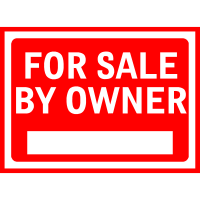For sale by owner

For Sale By Owner, or FSBO /ˈfɪzboʊ/, is the process of selling real estate without the representation of a real estate broker or real estate agent. Homeowners may employ the services of marketing or online listing companies or market their own property but do not pay a commission and represent themselves with the help of a lawyer or Solicitor (mostly in Commonwealth) throughout the sale.
Interaction with Real Estate Agents
One of the most popular reasons why homeowners choose to sell their house without the assistance of an agent is to avoid paying an agent's commission.[1] In the US the agent's fee is, on average, 6% of the selling price of the property.[2]
When a homeowner decides to sell their home without a real estate agent and a buyer who is not working with an agent wants to buy the home, the seller pays no commission because no real estate agents are involved.
If a buyer who is represented by an agent is interested in a FSBO home, that buyer's agent may request the owner pay him or her a commission, or finder's fee, for bringing the buyer. The seller may choose to either pay the fee or refuse. The seller is not legally obligated to pay any commission. If no agreement is in place with either the home buyer or the owner of the FSBO property, the buyer's agent may not necessarily be compensated in the transaction, or may be compensated by the buyer.
Market Share
Canada
Separate reports from the Canadian Real Estate Association and CTV Consumer Reports state that between 20% and 25% of homes in Canada are not sold through brokers each year.[3] MSN Money suggests that 30% of homes are sold without using a real estate agent.[4]
More than half of the homes sold in Quebec are sold without an agent.[5]
UK
In the UK, the average commission rate is significantly lower than in Canada or the US. Properties for sale by owner are less common.[1] By law, all sales of property have to be supervised and handled by an independent solicitor who acts as a mediator and holds the buyer's money until the purchase process is finished.[6]
USA
According to a 2015 report by the National Association of Realtors (NAR) regarding home buyer and seller trends, Home Buyer and Seller Generational Trends Report 2015, 9% of surveyed real estate transactions between July 2013 and June 2014 were FSBO, down from 13% in 2008, and a previous peak of 18% in 1997.[7] The record percentage of 20% of US real estate transactions (since tracking started in 1981) took place in 1987.
Some critics of the National Association of Realtors' report believe those statistics may be misleading and suggest that the true size of the U.S. FSBO market is closer to 22% because a 2009 report also found that flat-fee MLS now makes up 10% of transactions. They argue that flat-fee MLS sellers are in substance FSBO sellers. Unlike traditional real estate agent clients, flat-fee sellers are not committed to paying a commission and still advertise their homes as being for sale by owner.
According to the NAR report, 2014 Profile of Home Buyers and Sellers, homes sold by agents typically sold for 13 percent more than homes sold directly to buyers by homeowners.[8] Others point out that NAR included mobile homes in that result which skews the median FSBO sale price lower because mobile homes are typically sold as FSBOs and are typically very low priced relative to other home types.[9] NAR does not publish results which compare the median sale price of single-family detached homes sold with the help of real estate agents to the median sale price of single-family detached homes sold without the help of real estate agents (FSBOs).
Australia
In Australia, the FSBO is still relatively niche market. According to RP data, privately sold houses in Canberra are spending about 34 days on the market - the second least amount of time in the country. Canberra houses sold by private treaty spent the same time on the market as those in Melbourne - a week longer than Sydney, where houses are on the market for an average of 27 days. Privately sold units in Canberra spend an average of 54 days on the market, third only to Sydney (23 days) and Melbourne (37 days) when compared with other capital cities. Darwin recorded the longest average time on market for houses (85 days) and units (80 days). In Canberra, the average vendor discount - the difference between the original listing price and final sale price - was 4.4 per cent for houses compared to 3.7 per cent for units. Canberra recorded 165 house and 46 unit sales in this period, with a median price of $540,000 for houses and $397,500 for units. [10]
References
- 1 2 Ian Rose (2006-11-23). "BBC News Can you beat the estate agent". Retrieved 2009-09-06.
- ↑ Birger, Jon. "Feds Probe Real Estate Agents" CNN, Retrieved 2006-06-18
- ↑ Akin, David (2004-09-25). "Conducting the ultimate yard sale". The Globe and Mail. Retrieved 2014-06-10.
- ↑ Kerry Gold (2009-12-12). "Do you really need a real estate agent?". MSN Money. Retrieved 2014-06-10.
- ↑ Peter Diekmeyer (2009-11-16). "Realtors feel the heat - A Competition Bureau investigation could force changes on the real estate industry.". Retrieved 2009-11-17.
- ↑ https://www.gov.uk/buy-sell-your-home/transferring-ownership-conveyancing
- ↑ "Home Buyer and Seller Generational Trends Report 2015" (PDF). National Association of Realtors. 2015.
- ↑ "2014 Profile of Home Buyers and Sellers" (PDF). National Association of Realtors. 2014.
- ↑ "FSBOs vs. Real Estate Agents; Do agents really sell homes for 13% more?". Real Estate Decoded. Retrieved 22 April 2015.
- ↑ "Private house sales in Sydney quickest in country". Seek Estate. 1 June 2014.